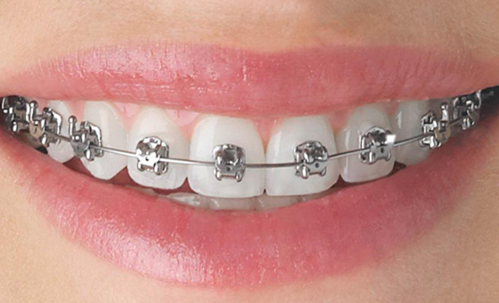Braces & Alignment
Orthodontics
Orthodontic treatment is a way of straightening or moving teeth.
Many people have crowded or crooked teeth. Orthodontic treatment will straighten the teeth or move them into a better position. This can improve their appearance and the way the teeth bite together, while also making them easier to clean.
Some people have upper front teeth that stick out and look unsightly. These ‘prominent’ teeth are more likely to be damaged, but orthodontic treatment can move them back into line. Or the way the upper and lower jaws meet can cause teeth to look unsightly and lead to an incorrect bite. Orthodontic treatment may be able to correct both of these problems.
When the teeth don’t meet correctly, this can put strain on the muscles of the jaw, causing jaw and joint problems and sometimes headaches. Orthodontic treatment can help you to bite more evenly and reduce the strain.

What is orthodontic treatment?
Orthodontic treatment is a way of straightening or moving teeth, to improve the appearance of the teeth and how they work. It can also help to look after the long-term health of your teeth, gums and jaw joints, by spreading the biting pressure over all your teeth.
Why should I have orthodontic treatment?
Many people have crowded or crooked teeth. Orthodontic treatment will straighten the teeth or move them into a better position. This can improve their appearance and the way the teeth bite together, while also making them easier to clean.
Some people have upper front teeth that stick out and look unsightly. These ‘prominent’ teeth are more likely to be damaged, but orthodontic treatment can move them back into line. Or the way the upper and lower jaws meet can cause teeth to look unsightly and lead to an incorrect bite. Orthodontic treatment may be able to correct both of these problems.
When the teeth don’t meet correctly, this can put strain on the muscles of the jaw, causing jaw and joint problems and sometimes headaches. Orthodontic treatment can help you to bite more evenly and reduce the strain.
At what age should I have orthodontic treatment?
The best time is generally during childhood, but adults can have orthodontic treatment too – and more and more are doing so. Age is less important than having the right number of teeth. In children it may be necessary to wait for enough teeth to come through before starting treatment.
Who carries out orthodontics?
Your dentist may carry out orthodontic treatment. Or they may send you to a specialist who has extra qualifications. The specialist may be in a practice or in a hospital department, and is called an orthodontist.
What does it involve?
The most important thing is to have a full examination. This will usually involve looking at your teeth, taking dental x-rays and making plaster models of your teeth.
Your dental team or orthodontist will then discuss what treatment is possible. Once you are sure you want to go ahead, the treatment can start as soon as you have enough permanent teeth.
Will I need to have teeth taken out to make room?
You may not have enough room for all your permanent teeth. If so, you may need to have some permanent teeth taken out to make space. Your dental team will tell you whether this is the case. Sometimes space can be made using other forms of treatment.
Taking Care Of Your Treatment
Maintenance is Key
It is important to keep having your teeth checked by your dental team while you are having orthodontic treatment. You also need to take extra care of your teeth and mouth:
Clean your teeth carefully every day, including between your teeth where you can. Braces are delicate and you need to make sure you clean them carefully so that they do not break. Your dental team will be able to show you the special techniques to use depending on the appliance you are wearing.
Cut down on how often you have sugary foods and drinks. Avoid snacks and drinks containing sugars, and fizzy drinks. Also, sticky and hard foods may damage your brace.
Brush your teeth last thing at night and at least one other time during the day. Use a mouthwash if you need to. Your dental team may recommend a stronger fluoride toothpaste, or perhaps a fluoride gel or mouth rinse, for you to use.
